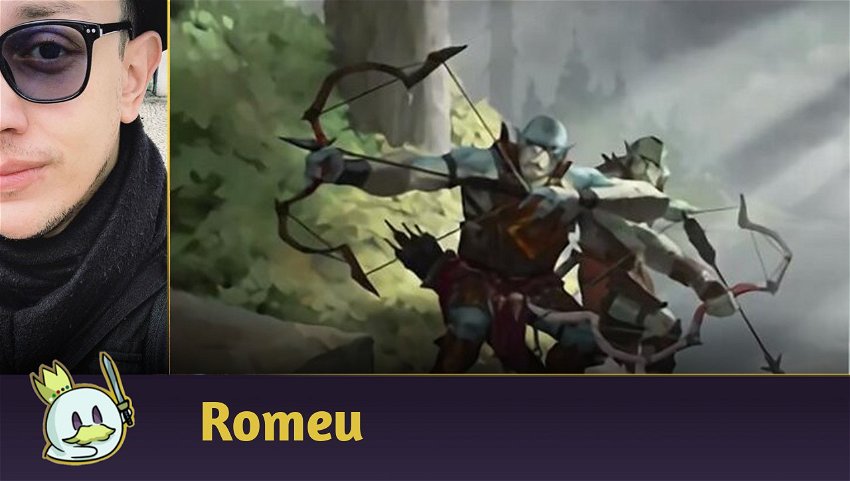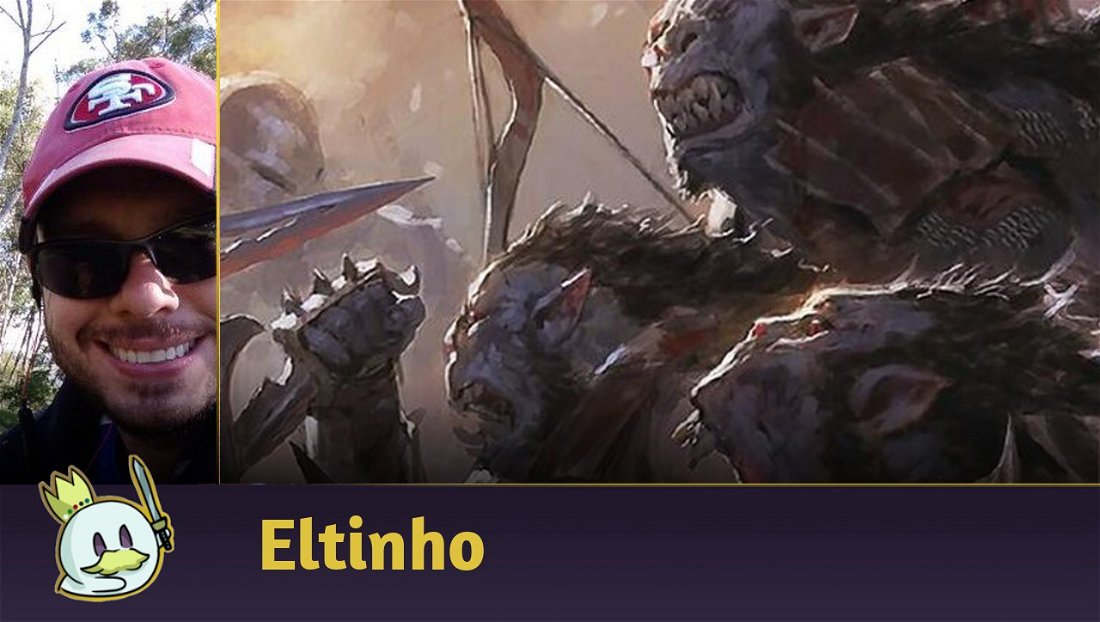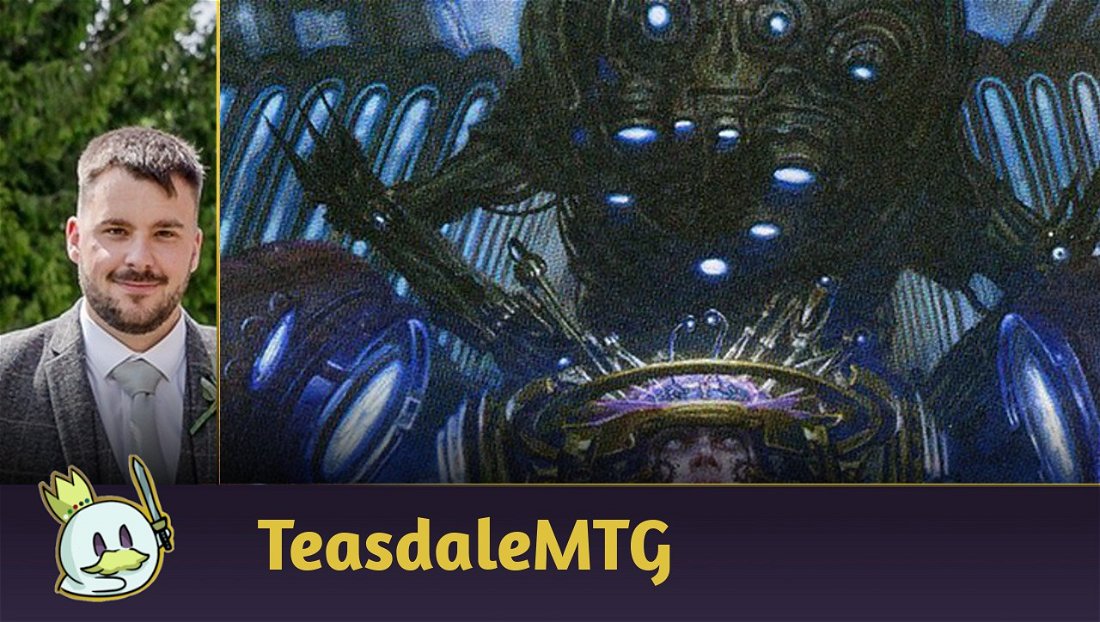Lord of the Rings: Tales of the Middle-Earth is part of the Universes Beyond series of Magic: The Gathering products, where cards with themes from other franchises are released in a specific product.
Unlike previous products in this series, LOTR cards will be legal in Modern. Therefore, we can assess the potential for new spoilers for the format as they are revealed.
Since the season's first day, one creature has been receiving attention from the community of all eternal formats due to its potential: Orcish Bowmasters. In today's article, we're going to delve into how much it can impact Modern's competitive landscape.
Orcish Bowmasters - The Review

Orcish Bowmasters have all the qualities a card needs to be present in the competitive Metagame on eternal formats: its body, split into two creatures, is decent, its cost is appropriate and easy to use with splashes for other colors, and its ability is very interactive against some of these formats' top cards.
In addition, the creature has Flash, that is, the ability to be cast at any time in the game, and even in response to other spells on the stack. Its main comparison has been in response to Brainstorm, where, if it comes into play, the Orc will deal 4 damage to any number of targets, create a 4/4 token, and still keep an effect in play that punishes the opponent if they need to cast another cantrip before killing it.
But not everything is rosy when it comes to its potential. Despite its flexibility, in a vacuum, we're still talking about a card that creates two 1/1 creatures and deals one damage to any target when it comes into play, which leaves a lot to be desired compared to the power level of other creatures these formats have.
Orcish Bowmasters adds value depending on whether the format it fits in is amenable to its abilities - if there are plenty of cantrips, draw effects, and especially many targets that don't survive the recurring damage it deals, the better. Otherwise, it's just another excellent card in an unfavorable environment.
Orcish Bowmasters in Modern
In Modern, there is no lack of creatures and strategies that are severely punished by Orcish Bowmasters. If we consider the most played decks in the format today, we have the following archetypes who run some draw effects or cantrips: Izzet Murktide, Rakdos Undying, Living End, Golgari Yawgmoth, Jeskai Breach, Affinity, and on a smaller scale of card draws, Four-Color Creativity, Elementals, Tron and Temur Footfalls.

Among these, the strategy that suffers the most against Orcish Bowmasters are the Turbo Xerox decks, that is, those that resort to a large number of cantrips to filter their top. Prime examples of this strategy in Modern are Izzet Murktide and Jeskai Breach.
These archetypes rely on Mishra's Bauble, Consider and Ledger Shredder as draw effects that they often abuse. Therefore, an Orcish Bowmasters with too much time in play can dominate the game on their own against them.

The fact that two of its main threats - Ragavan, Nimble Pilferer and Dragon's Rage Channeler - are very vulnerable to this creature is also an excellent bonus for its controller, especially considering that its ability to damage and token creation is also an ETB trigger!, meaning we can use it to kill these threats even if the opponent decides to play around and not cast cantrips at inopportune times.

The matchup against Rakdos Midrange is very interesting for Orcish Bowmasters. While the archetype isn't as vulnerable to it as Turbo Xerox decks are, these strategies rely on a decent number of draw effects to make it relevant.
For example, casting it in response to Seasoned Pyromancer grants three damage across any number of targets, can kill the Pyromancer itself, an Elemental token, and still create a 3/3 token in play.
The same can occur with Fable of the Mirror-Breaker; however, you must cast the Orc in response to the second chapter's trigger, which gives the opponent the option of not discarding cards to prevent one of their creatures from dying and/or that it takes a Lightning Bolt for free this turn.

Orcish Bowmasters would already be decent in the matchup against Hammer Time for offering two blockers and still killing a 1/1 creature the moment it comes into play. Alone, it kills Esper Sentinel, Giver of Runes, Memnite, or Gingerbrute before any equipment is attached to them.
With a trigger from Esper Sentinel or Puresteel Paladin on the stack, the creature can also deal with Stoneforge Mystic, Ornithopter, and the aforementioned Puresteel Paladin.
In these cases, Orcs aren't good enough, as these are conditional situations where, for some reason, the opponent has not yet established themselves in the matchup, and Bowmasters play poorly against Urza's Saga's tokens, despite delaying their clock with blockers.

The orcs also have a peculiar against Teferi, Time Raveler. You cannot respond to the Planeswalker's bounce + draw ability by casting it, but Orcish Bowmasters can be played in response to Teferi's cast, which will limit the opponent to increasing the number of counters on Teferi instead of using the bounce, to ensure it stays in play longer.
The difference may seem minimal in some games, but avoiding the Tempo play that Teferi, Time Raveler provides also means limiting your opponent's interaction space, and leads to situations where we can, for example, avoid the perfect timing of an Indomitable Creativity.
Also, if the opponent uses this ability to remove a threat and leaves Teferi with only one counter, you can still cast Orcish Bowmasters in your main phase to kill the Planeswalker and put two bodies on the battlefield.

In other cases, Orcish Bowmasters seems less relevant than in the situations above, but still ensures a certain level of interactivity in the game. For example, against Living End, this creature punishes Cycling, but doesn't offer a fast enough clock if we don't have a backup disruption.
Golgari Yawgmoth manages to deal with it far too easily before continuing with its combos. It still serves to kill a mana dork in the first few turns, but with this archetype more focused on using Arboreal Grazer and the possibility of Delighted Halfling becoming the second mana dork to protect Yawgmoth, Thran Physician from counterspells, Bowmasters' interaction on this matchup decreases by a huge margin.
Temur Footfalls only has Fire / Ice as a draw effect, and the ping of Orcish Bowmasters is irrelevant when the threats are 4/4 tokens and/or a Murktide Regent. The same goes for Tron and Elementals.

We also cannot forget the potential that Orcish Bowmasters presents against small creatures from aggressive decks. While it isn't as limiting as Fury against these strategies, it still grants two blockers and one damage against a small threat.
What strategies might want Orcish Bowmasters ?
The Rakdos Midrange, or Rakdos Undying, is the archetype likely to take advantage of the new creature, especially since it lacks a good two-mana threat.

It's common for Rakdos to run suboptimal creatures in the two-mana slot to respond to the Metagame, with most lists turning to Dauthi Voidwalker as an evasive creature and efficient graveyard hate. Others bet on Bloodtithe Harvester as a threat that doubles as removall, and that still guarantees filtering with the Blood token.
Orcish Bowmasters fits nicely into that slot in Modern's current Metagame, but it doesn't seem to be on Ragavan, Nimble Pilferer level of becoming an instant, hardcore staple. As the competitive environment adapts, new strategies may emerge, and Bowmasters may lose their slot to a more efficient creature for a given environment.

I think Bowmasters' entry into Modern is a good reason for Turbo Xerox players - especially Breach variants - to reconsider splashing black over white, as the creature offers a lot of value and is at an appropriate cost.
In this case, Grixis Shadow variants that take advantage of Underworld Breach to create multiple triggers with Ledger Shredder can be a good start, but it requires care when executing the combo, since the opponent's Orcish Bowmasters can target players as well.
Conclusion
Orcish Bowmasters is, to date, the best card from Lord of the Rings for competitive formats. It has enough potential to change the Modern Metagame, end Izzet Murktide's reign, and put a limit on strategies that draw multiple cards, in addition to another obstacle for decks that resort to small creatures.
However, it isn't perfect and doesn't feel like an "absolute staple" like Ragavan, Nimble Pilferer, as it is efficient in specific environments, while losing its slots to more useful cards as the Metagame changes and adapts.
Thanks for reading!













— Comments 0
, Reactions 1
Be the first to comment